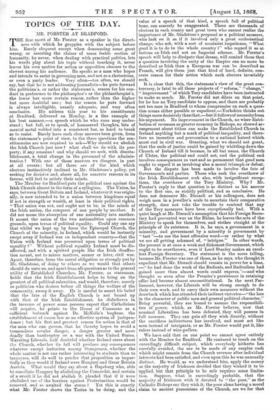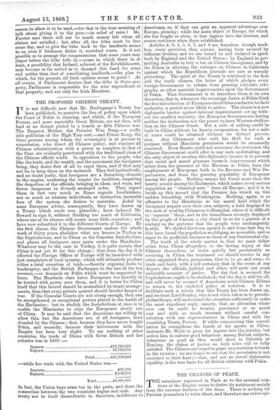TOPICS OF THE DAY.
MR. FORSTER AT BRADFORD.
conclusive. His address this year to his constituents at Bradford, delivered on Monday, is a fine example of his best manner,—a speech which he who runs may under- stand ; but full, so to speak, of hammered thoughts, bits of mental metal welded into a consistent bar, as hard to break as to resist. Rarely have such clear answers been given, from the statesman's point of view, to the three questions the con- stituencies are now required to ask—Why should we abolish the Irish Church just now ? what shall we do with its pro- perty, if any remains ? and why should we seek, with disesta- blishment, a total change in the personnel of the adminis- tration? With one of 'those answers we disagree, in part at all events ; but all three are of the kind which electors instinctively inclined to Mr. Gladstone's policy, yet seeking for decisive and, above all, for concrete reasons in its favour, will feel to satisfy their minds.
The Member for Bradford puts the political case against the Irish Church almost in the form of a syllogism. The Union, he says, between Great Britain and Ireland, whatever it was origin- ally, is now intended to be a union between kingdoms equal if not in strength or wealth, at least in their political rights. " That union was not, and ought not to be, in the minds of the Irish nation, the conquest of one people by another. It did not mean the absorption of one nationality into another. It meant the union of the two nationalities upon common grounds, upon terms of political equality. Could any one say that whilst we kept up by force the Episcopal Church, the Church of the minority, in Ireland, which would be instantly swept away if Ireland was an independent country—that the Union with Ireland was preserved upon terms of political equality ?" Without political equality Ireland must be dis- affected, and with a spirited people like the Irish disaffec- tion meant, not to mince matters, sooner or later, civil war. Apart, therefore, from the moral obligation so strongly put by Mr. Gladstone, of doing to others as we would that others should do unto us, and apart from all questions as to the general utility of Established Churches, Mr. Forster, as statesman, holds that the Irish Establishment helps to bring on the greatest of all political calamities, and would, therefore, merely as politician who desires before all things the welfare of the community, sweep it away. He is careful to assert his belief that the fate of the English Church is not bound up with that of the Irish Establishment, he disbelieves in the increase of power some persons expect that Catholicism will acquire, he points to the House of Commons as a sufficient bulwark against Dr. McNeile's bugbear, the establishment of canon law as an effective system of jurispru- dence; but his first and greatest reason for action is that of the man who can govern, that he thereby hopes to avoid a tremendous secular danger, a danger greater and more deadly than bankruptcy or a war with the United States. Wavering Liberals, half doubtful whether Ireland cares about the Church, whether its fall will produce any consequences whatever except irritation among Orangemen, whether the whole matter is not one rather interesting to students than to taxpayers, will do well to ponder that proposition as impar- tially as they would if Ireland were Hungary and Great Britain Austria. What would they say about a Hapsburg who, able tr.) conciliate Hungary by abolishing the Concordat, and certain of a revolt if he did not abolish it, pleaded that if it were abolished one of the barriers against Protestantism would be removed, and so awaited the storm ? Yet this is exactly what Mr. Forster shows the Tories to be doing, and the value of a speech of that kind, a speech full of political bone, can scarcely be exaggerated. There are thousands of electors in each county and great town who cannot realize the importance of Mr. Gladstone's proposal as a political measure, who look on it as if it involved only a great ecclesiastical change, who ask, with a sort of secularist impatience, "What good it is to do to the whole country ?" who regard it as at bottom an Irish and not an Imperial scheme. Mr. Forster's. speech will help to dissipate that dream, will remind them that a question involving the unity of the Empire can no more be described as Irish than a European war can be described as French, will give them just that kind of hard, definite, con- crete reason for their action which such electors invariably seek.
It is clear that this, the statesman's view of the great con- troversy, is fatal to all those projects of "reform," "change," " improvement " of which Tory candidates have been instructed to make so much. Mr. Forster did not dilate on that for he has no Tory candidate to oppose, and there are probably not ten men in Bradford to whom compromise on such a ques- tion seems either possible or expedient,—Yorkshire thinks out things more decisively than that,—but it follows of necessity from. his argument. No improvement in the Church, no wiser distri- bution of revenues or greater economy in Bishops, no shrewd ar- rangement about tithes can make the Established Church in Ireland anything but a mark of political inequality, and there- fore an incentive and provocation to a national hatred which_ must end in civil war. Granting, what we should not grant, that the ends of justice could be gained by whittling down the Church of Ireland till it became, in all but name, the Church. of Ulster, the political end could not, and the political end involves consequences so vast and so permanent that good men ought to regard it as involving also a moral triumph or defeat Butthe dispute has been made to involve the fate of Governments and parties. Those who seek the overthrow of the Irish Establishment seek also, with insignificant excep- tions, the overthrow of the Tory Ministry. Why ? Mr. Forster's reply to that question is as distinct as his answer to the first one, as strictly political, and as conclusive. He does not denounce Mr. Disraeli or his colleagues, does not weigh men in a jeweller's scale to ascertain their comparative strength, does not take the trouble to contend that any of the Tory measures have been exceptionally bad. With a. quiet laugh at Mr. Disraeli's assumption that his Foreign Secre- tary had prevented war on the Rhine, he leaves the acts of the Ministry to speak for themselves, and strikes straight at the principle of its existence. It is, he says, a government in a minority, and government by a minority is government by "tact "—to use the least offensive word—or rather by what we are all getting ashamed of, "intrigue." In other words, the present is at once a weak and dishonest Government, which ought to be overthrown, even if Lord Stanley makes an excel- lent Foreign Secretary. The statement is the more telling, because Mr. Forster was one of those, as he says, who thought it. expedient that Mr. Disraeli should remain in power for a time, —" be had done the work of the Radicals, and Radicalism had gained more than almost words could express,"—and who thought so even after the Premier's persistence in retaining- office had become almost unconstitutional. In the next Par- liament, however, the Liberals will be strong enough to do. their own work, and to carry their own measures without the drawback which has attended their indirect victories—"the loss in the character of public men and general political character." Being powerful, they are bound to assume the responsibili- ties of power, which, as Mr. Forster believes, now that nominal Liberalism has been defeated, they will possess in full measure. They can gain all they wish directly, without the sacrifices indirectness has involved, and must act like men instead of intrigants, or as Mr. Forster would put it, like rulers instead of wire-pullers.
We have said that on one point we cannot agree entirely with the Member for Bradford. He ventured to touch on the exceedingly difficult subject, which everybody hitherto has carefully avoided, the use to be made of any surplus cash which might remain from the Church revenue after individual interests had been satisfied, and even upon this he was unusually distinct. He would, as we understand him, apply the money as the majority of Irishmen decided that they wished it to be applied, but that principle to be safe requires some limita- tion. Suppose, what is exceedingly probable, that the majority of Irishmen wish it devoted to "the poor," as the Catholic Bishops say they wish it, the poor alone having a moral claim to ancient possessions of the Church, are we for that
reason to allow it to be used,—for that is the true meaning of talk about giving it to the poor,—in relief of rates? Mr. Forster says there will not be much money left when all claims are satisfied ; but, after all, the tithe must be free .some day, and to give the tithe back to the landlords seems to us, even if Irishmen desire it, wretched waste. Is it not possible so to arrange the compensations that some years may elapse before the tithe falls in,—years in which there is, at least, a possibility that Ireland, relieved of the Establishment, may become so far united as to demand this fund for some .end nobler than that of conciliating landlords,—the plan to which, for the present, all Irish opinion seems to point ? At all events, if Parliament decrees that the tithe is State pro- perty, Parliament is responsible for the wise expenditure of that property, and not only the Irish Members.































 Previous page
Previous page